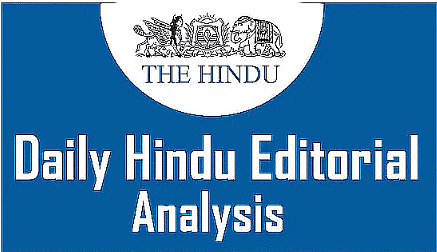The Hindu Editorial Analysis- 20th February 2023 | Current Affairs & Hindu Analysis: Daily, Weekly & Monthly - UPSC PDF Download

The curious case of the disqualification of a politician
The instance where the Kerala High Court, in January this year, suspended the verdict passed by the Kavaratti District and Sessions Court (in an attempt to murder case) in which the then sitting Member of Parliament (MP) of Lakshadweep and Nationalist Congress Party leader Mohammed Faizal P.P. was sentenced to 10 years in jail, has raised an interesting question on his disqualification.Constitutional provisions:
Disqualifications under the Constitution, a person shall be disqualified for being chosen as and for being a member of the legislative assembly or legislative council of a state:
- If he/she holds any office of profit under the Union or state government (except that of a minister or any other office exempted by state legislature),
- If he/she is of unsound mind and stands so declared by a court,
- If he/she is an undischarged insolvent,
- If he/she is not a citizen of India or has voluntarily acquired the citizenship of a foreign state or is under any acknowledgement of allegiance to a foreign state, and
- If he/she is so disqualified under any law made by Parliament.
Article 327 and 328 of the Constitution confers the power on parliament and state legislature respectively to make rules for election to Parliament and state legislature.
Apart from these, the Parliament has prescribed several additional disqualifications in the Representation of People Act (1951). These include,
- He/she must not have been found guilty of certain election offences or corrupt practices in the elections.
- He/she must not have been convicted for any offence resulting in imprisonment for two or more years. But, the detention of a person under a preventive detention law is not a disqualification.
- He/she must not have failed to lodge an account of his election expenses within the time.
- He/she must not have any interest in government contracts, works, or services.
- He/she must not have been dismissed from government service for corruption or disloyalty to the state.
In such case of Disqualification, it is decided by the President/ governor for MP and MLA respectively and his decision is final. However, he/she should obtain the opinion of the Election Commission and act accordingly.
Anti-Defection Law
- The Tenth Schedule – popularly known as the Anti-Defection Act – was included in the Constitution via the 52nd Amendment Act, 1985 and sets the provisions for disqualification of elected members on the grounds of defection to another political party.
- It was a response to the toppling of multiple state governments by party-hopping MLAs after the general elections of 1967.
- However, it allows a group of MP/MLAs to join another political party without inviting the penalty for defection. And it does not penalise political parties for encouraging or accepting defecting legislators.
- As per the 1985 Act, a ‘defection’ by one-third of the elected members of a political party was considered a ‘merger’.
- But the 91st Constitutional Amendment Act, 2003, changed this and now at least two-thirds of the members of a party have to be in favour of a “merger” for it to have validity in the eyes of the law.
- The decision on questions as to disqualification on ground of defection are referred to the Chairman or the Speaker of such House, which is subject to ‘Judicial review’.
- However, the law does not provide a time-frame within which the presiding officer has to decide a defection case.
Grounds of Disqualification:
- If an elected member voluntarily gives up his membership of a political party.
- If he votes or abstains from voting in such House contrary to any direction issued by his political party or anyone authorised to do so, without obtaining prior permission.
- As a pre-condition for his disqualification, his abstention from voting should not be condoned by his party or the authorised person within 15 days of such incident.
- If any independently elected member joins any political party.
- If any nominated member joins any political party after the expiry of six months.
- If government stability is an issue due to people defecting from their parties, the answer is for parties to strengthen their internal part of democracy.
- There is an ardent need for legislation that governs political parties in India. Such a law should bring political parties under RTI, strengthen intra-party democracy, etc.
- Chairman/Speaker of the house, being the final authority in terms of defection, affects the doctrine of separation of powers. In this context, transferring this power to higher judiciary or to Election Commission may curb the menace of defection.
- In order to shield the detrimental effect of the anti-defection law on representative democracy, the scope of the law can be restricted to only those laws, where the defeat of government can lead to loss of confidence.
|
38 videos|5293 docs|1118 tests
|
















